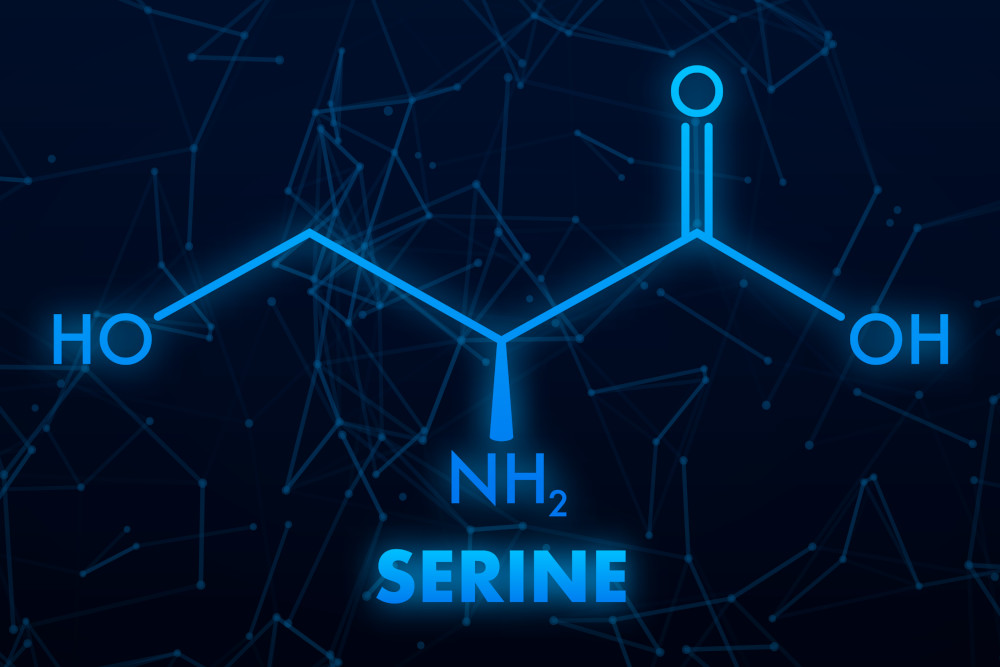Serine - occurrence, properties and dosage

Serine is an amino acid that is essential for the proper functioning of the body: it aids in the digestion of proteins, supports memory, concentration and the process of reproducing information, and supports the immune system. It comes in two forms - L-serine, which is supplied to the body with food, and D-serine, which is formed from L-serine. What is worth knowing about this amino acid? What is its action? Is it worth taking it?
What is serine?
α-amino-β-hydroxypropionic acid, or serine, is an organic chemical compound from the group of endogenous amino acids. Serine is a component of casein. It is formed from 3-phosphoglycerate and is a precursor of glycine and cysteine.
Serine is one of the amino acids that ensure the proper functioning of the body. Endogenous amino acids, to which it belongs, unlike essential amino acids, can be produced by the body naturally.
Sources of serine
Serine occurs naturally in the human brain, but we can also supply it with food (it is a component of proteins). A large amount of serine can be found primarily in casein which is the primary protein of cow's milk, as well as in other products such as pumpkin seeds, sesame, gelatin, flax seeds, wheat germ, soy milk, legumes, nuts, gelatin, fish meat.
Properties of serine
Serine exhibits a range of health-promoting properties that support overall health, cognitive function and beautiful appearance. Participates in protein digestion as a component of serine proteases, in fat metabolism, and is involved in immunoglobulin production and stimulates antibody production. It is also a precursor of thyroid hormones.
The compound can reduce levels of cortisol - the so-called stress hormone that rises when we are nervous. This endogenous amino acid may also have an effect on the development of muscle tissue, as well as lowering the level of pain experienced.
Serine improves human thought processes. It participates in the process of nucleotide synthesis, so it is able to affect the brain. It can support the functioning of the nervous system by regulating the work of neurons. In addition, it supports the formation of the myelin sheath of the neuron. Thanks to this, it shows a beneficial effect on the work of the brain - it intensifies coding processes in neurons, supports memory, concentration, attention.
Serine in cosmetics
Serine is also very commonly used in cosmetics. We can find it primarily in face creams, tonics and hair products. Stabilizes the skin's pH, supports its natural protective barrier, and provides optimal hydration. In addition, it makes the skin less prone to irritation.
In addition, it improves the condition of hair, among other things, it shows anti-static effect and reduces hair static. Smooths and shines the hair surface.
Serine deficiency
Serine deficiencies are extremely rare and usually associated with poor diet or severe diseases. Some of the most common symptoms of too little serine in the body include mood deterioration, chronic lack of energy and depressive states.
Recommended products
Serine dosage
L-serine is primarily recommended for people who want to support their cognitive function and immune system. A dietary supplement containing serine is also a common choice among athletes and physically active people who want to improve muscle tissue growth.
The recommended daily dose of serine is 30 mg per kilogram of body weight. Studies indicate that this is the minimum dose that can have an impact on improving cognitive abilities in people suffering from a wide variety of diseases. An overdose of the amino acid is not associated with serious health consequences.
Dietary supplements with serine
Dietary supplements based on pure serine are still a rarity. L-serine is available in capsule or powder form. Much more often, the amino acid is an additive to multicomponent preparations and cosmetics. Serine can also be found in most protein supplements.
Assimilation of serine
Supplementing vitamins B6, B9, copper and iron along with serine can support the nootropic properties brought by this endogenous amino acid.
Contraindications
People with hyperthyroidism and Graves-Basedow disease should not supplement with serine, because it can cause an increased level of thyroid hormones.
Sources:
- https://www.sciencedirect.com/topics/neuroscience/serine
- https://pubchem.ncbi.nlm.nih.gov/compound/Serine
- https://pubmed.ncbi.nlm.nih.gov/9836012/
- https://pubmed.ncbi.nlm.nih.gov/26791617/
- https://pubmed.ncbi.nlm.nih.gov/23041616/
- https://pubmed.ncbi.nlm.nih.gov/24086518/
- https://pubmed.ncbi.nlm.nih.gov/18319065/
